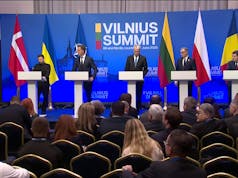Israel-Gaza conflict: when social media fakes are rampant, news verification is vital.
As news of Palestinian militant group Hamas launching a deadly attack on Israel and Israel’s threat of retaliation began to filter across news networks and social media platforms, a wave of misinformation and fake videos rose alongside.
In a “tech-first” society, it is increasingly difficult to differentiate between authentic information and false claims or deliberately misleading video content.
It is clear that numerous videos, social media posts and images purportedly about the Israel–Hamas conflict are deliberately misleading.
Written by Mitali Mukherjee, Acting director of the Reuters Insitute for the Study of Journalism, University of Oxford. This article is the opinion of the authors and not necessarily that of the UK Defence Journal. If you would like to submit your own article on this topic or any other, please see our submission guidelines.
This problem highlights why the verification efforts of journalists reporting on conflicts are vital. And understanding how they work is important for ensuring the public can have confidence in what they read and see from media publishers.
The Digital News Report 2023 from the University of Oxford’s Reuters Institute, of which I am acting director, surveyed people from 46 countries about their news consumption habits. It found 56% said they were worried about identifying the difference between what is real and fake on the internet when it comes to news – up from 54% in 2022.
There is heightened concern among audiences in areas close to violent conflict. As our survey found, in Slovakia, one of the countries bordering Ukraine, almost half the sample said they had seen misinformation about the Ukraine conflict in the previous week. That’s double the proportion that said this in the UK, United States or Japan.
Several media reports have pointed to a surge of fake posts around the Israel-Hamas conflict on Twitter (now known as X), which has recently made significant changes in how it operates. The Guardian pointed to data from Israeli monitoring firm Cyabra, which covers US election disinformation and tracks bot accounts on Twitter, to demonstrate the levels of fake posts.
Cyabra claimed that many were coming from fake accounts – using automated bots – which were very active on Twitter, TikTok and other platforms. Cyabra scanned over two million pictures, posts and videos. Out of 162,000 profiles, 25% were fake, it claimed.
How verification can work
In the last few years, many traditional media outlets had robust factchecking arms that were flagging fake news and videos quickly. An example of that is BBC Verify. Started in 2023, BBC Verify aims to build audience trust by showing how its journalists know what they are reporting is accurate. The team of journalists use advanced editorial tools and techniques to investigate, source and verify information, video and images.
BBC Verify has been flagging videos and social media posts about Israel and Gaza that they have found to be either untrue or misleading. In the case of the attack by Hamas on the Supernova festival in a remote area of southern Israel, factchecking arms including BBC Verify pieced events together to check accuracy of claims using video and social media posts, dash cam footage from parked cars and facial recognition technology such as Amazon Rekognition software.
I would stress that, although there are many useful tools that can help with this work, it’s important for humans to ultimately review automated factchecking apps and tools.
AP Fact Check and Reuters have also been addressing misinformation online. A recent example is how Reuters factchecked a clip being circulated online with the false claim that the video showed how Israel or Palestine was attempting to create fake footage of deaths. The news agency had previously highlighted the origins of this film clip when it was previously shared in 2022.
In its analysis, Reuters said: “Claims that the clip shows Israelis or Palestinians faking death footage are false, however. Reuters previously addressed the clip when it was shared in 2022 with claims it showed Palestinians staging a fake killing and reported that it shows behind the scenes footage of a Palestinian production.” It added that what the clip actually shows is the filming of Empty Place, a short movie released in 2022 on YouTube.
Long-standing challenges around social media platforms, and people’s reliance on them as news sources, do seem to have an impact on how confident people feel about the information they come across. So more than ever before, there is a need for verifiable, clear and fact-based news gathering. Violent conflict needs responsible, sensitive and timely attention and communication from journalists across the world.
In the words of the pioneering American broadcast journalist Edward Murrow: “The speed of communications is wondrous to behold. It is also true that speed can multiply the distribution of information that we know to be untrue.”![]()
This article is republished from The Conversation with permission under a Creative Commons license. Read the original article.














Social as well as media disinformation is all a part of cognitive warfare, and I have no doubt that a cognitive war is being waged all around us. There was a good short article on it in Defense One. As the NATO Review points out
This war is multivariate and it plays out not just in the mainstream media, but here and in social media sites. Whatever tactic is required to move people from against to undecided, or undecided to pro will be used; psychological manipulation abounds. Those of us who talk about “a plague on both your houses” are also participants and we need to remember that.
Fake news and mis information are tools to exploit a humans hardwiring. We all have cognitive bias so if something gets repeated enough it starts register as fact or truth. And now via social media there’s an amplifier effect. It’s being used very effectively by various groups, state actors and even our own political parties. No ones immune to it either. Remember also misinformation is not necessarily fake news, it’s perhaps amplify one fact whilst playing down or not stating other related facts.
https://en.wikipedia.org/wiki/Cognitive_bias
Are you sure you do enough to stop your own site being used for such?
Are you referring to articles or the comments on articles? The site articles are generally very well researched and on point. Comments are the views and opinions of those reading. Unlike X etc you can’t re-share etc a comment from this site to social media.
You may not like some of the comments because they don’t align with you’re opinion or biases (which everyone has) but that’s a completely different topic to the what being put out on social media where there’s entities seeking to use volumes of posts and snips of info to change the narrative and influence people biases.
I was asking what measures they took to avoid people using this site to spread lies and promote hate and violence. There are good reasons for the question.
If I have one complaint about an otherwise excellent site it would be the algorithm that sends comments off for moderation if there are even a modicum of links. Sometimes even one link sees to be enough, even it it points to this very website; sometimes not. Waiting to find if your comment gets through moderation breaks the flow of conversation.
Citing sources is one of the best ways to ensure that readers can understand and verify where the author is coming from. The algorithm encourages commentators to post without sources, making verification harder.
I know there has to be an algorithm, but I think perhaps it needs a tweak to allow us to add links to whitelisted sites with impunity.
Yes and while quicker approval would always be the ideal answer we must be reasonable about what we ask of a non-profit site run by volunteers.
One way around it would be to say ‘link to follow’ at the relevant points in your post; Post it; Then post the links in a follow on post.
Then people can read you comments in time as part of the debate, knowing the chance to fact check would be there soon(ish).
Another way around it would be to not link but post like this (search gaza +bombs and look for article in Decanter magazine). Perhaps one of the Moderators can tell us if that would be acceptable?
I agree, we can’t/shouldn’t expect faster moderation. I’m wondering if we can lessen the burden on moderators for a win/win.
Farouk uses something like that <Google such and such> technique you suggest and it seems to be okay. I should probably try it more. The “links to follow” method would increase the moderator burden and I’m loathe to do that.
When the Gaza hospital was struck, I was concerned by the instant Hamas claim that 800 were dead. I thought there was nowhere near enough time to find & count the bodies, so it seemed plucked out of the air to me. Yet the BBC believed it.
The problem the world has is certain states use Social Media for their own means , A year ago it was reported by Euronews and I quote:
Meta removes fake accounts from China and Russia sharing Ukraine war content
In Jan of last year they removed a network of fake accounts from iran I quote:
Looking at what is happening in the levant: Attacks from Gaza, Lebanon, Syria, West Bank and last night the downing of 3 Houthi cruise missiles (and a load of UAVs) by the USS Carney in the north of the Red Sea heading towards Israel by non state actors (other than Hamas) all of whom have links to Iran so it’s a no brainer to subscribe to the POV that Iran (as well as others) have weaponised Social media with fake information.
I was most interested regards BBC verify it was exposed the other week that Marianna Spring the lady in charge of it, lied to get a job. Ok maybe not the smoking Gun I am trying to claim. But what does it say when the head of the BBC disinformation department (as in exposing it) is revealed to have lied to get a job in….Moscow.
But I read the BBCs verifies page on the Hospital Bombing . Now after first blaming the IDF for a missile strike on the Hospital without verification and just taking Hamas word for it that 471 people had been killed, when dawn broke and photo and video evidence came out for all to see (Al Jazeera were live streaming the sky over Gaza at the time and caught both the missile flying up into the sky as part of a Salvo, but malfunctioning , exploding mid air, followed by a detonation 7 seconds later down below) revealed that actually and a big actually the damage wasn’t one you would expect from a JDAM (which is what the IDF have been using) if you haven’t seen the article google
Gaza hospital: What video, pictures and other evidence tell us about Al-Ahli hospital blast
The first picture of the blast area from above is very naughty as the picture has been edited to only show half the picture. Have a look at:
Aftermath of Al Ahli hospital blast.
The right of the picture ends with a press bloke wearing blue body armour and shows 13 burnt out vehicles. With a highlight that one is over turned. Yet if you go on line and check other pictures of the blast area there are 9 other cars in that car park not shown in that BBC picture which are not as badly damaged, and still retain their paintwork and even windscreens. So why did the BBC crop that photo? Was it to promote the line that the destruction was actually worse than it was.
The last photo in that BBC verify article shows the impact crater , as bomb/ explosion craters go its nothing and yet the BBC explains that small crater by posting this:
Yes they end with the line that it may not have been a Hellfire, but the seeds of doubt have been sown and lets be honest a hellfire travelling at speed would have dug a much bigger hole in the ground even if its warhead had failed to detonate
And its not just the BBC, others are just as bad, the current death toll inside Gaza is around 3700, yet and a big yet around 1000 of that figure is the Hamas gunmen who started this all. Anybody seen that mentioned by anybody (I had to look that figure up) instead all we are regaled to is 3700 Palestinians have been killed. Remember those figures are from the same people who screamed that Israel had killed 500 people bombing a hospital. (Possibly with a hellfire missile which sports a 9kg warhead)
When we have major media outfits willing to blur the lines to sell a story which people will believe, whislt we are correctly concerned about misinformation peddled on social media. But I feel that as much attention should be paid to our own media
Yes I fully understand that this is a very emotive subject and people will take sides based on their own mindsets , but the fact remains why our own media outlets should be held held to account as well.
I’m no longer going there… apparently any support for Israel’s right to defend itself and calling out Hamas as evil, means your supporting and calling for war crimes.
Unfortunately, truth is the first casualty of war.
bbc verify 😂😂😂 promoted by a so called journalist who was caught out lying on her cv 😂😂 Aye bbc verify real trustworthy. Even that investigative behemoth panorama caught out making shit up with John Sweeney (funny not seem him around in a while since he was exposed) 🤔
we need to accept we are in a post truth era now The msm are a sack of shit who’s only role is promoting whatever narrative our masters want us to believe.
🏴🇬🇧
This is shocking disgraceful article when most “prestige” and institutional media puts a blatant fake news from information that came directly from Hamas disguises any news of Hamas as “Gaza authorities” and pass any Gaza causalities numbers that come from Hamas as truth.
BBC, Reuters, The Guardian, Associated Press all did posted and give it “top news” to a fake news of an hospital attack that did not existed and 500 deaths that did not occurred.